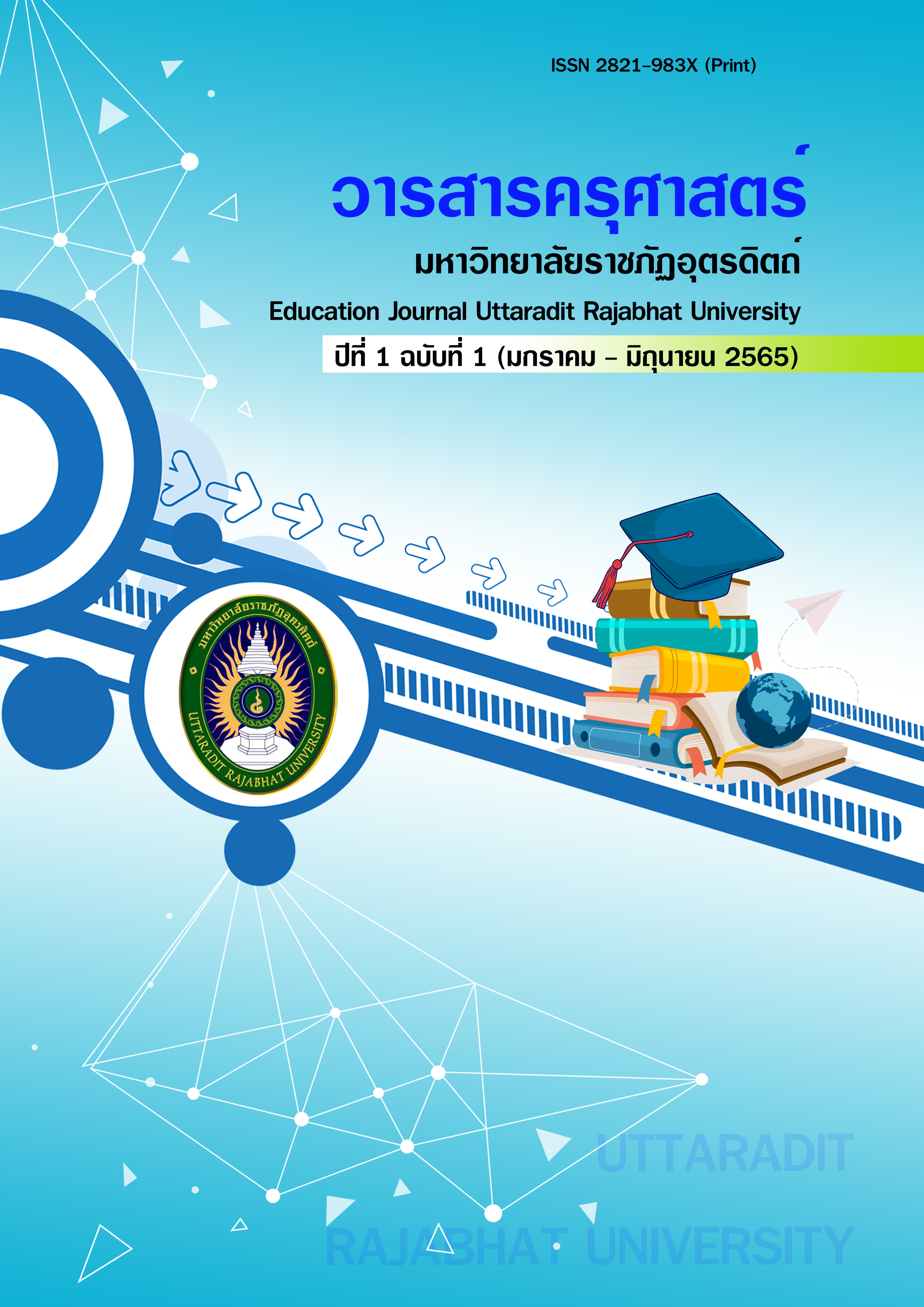The Development of Teaching and Learning Achievement in Mathematics Projects by CCR Teaching Techniques in Upper Secondary Level of Uttaradit Daruni School
Main Article Content
Abstract
The purpose of this research was to design teaching and learning mathematics projects using CCR teaching techniques to develop teaching and learning achievements in mathematics projects and to study the satisfaction of teaching and learning management in mathematics projects. The sample were 23 students in upper secondary level of Uttaradit Daruni School by purposive sampling. The data collecting by 6 math project learning management plans, math project learning achievement test and the questionnaire assessed the students' satisfaction with the learning management of mathematics projects using CCR teaching techniques. The data were analyzed by percentage, mean and standard deviation.
The results of the research revealed that the teaching model of mathematics project with the teaching technique of the CCR has 3 steps, which are: 1.stimulation stage, 2.support stage 3.escape stage, by integrating the Contemplative(C), Coaching (C) and Research Base Learning(R). The mean score after learning was 24.40, the mean score before learning was 12.19. When testing the difference of mean, it was found that the results of mathematics teaching by using the teaching and learning of mathematics projects with CCR teaching technique were higher than before by significant at the 0.05 level. The students had the highest level of satisfaction with teaching and learning mathematics projects using CCR teaching techniques (= 4.78, S.D.= 1.05).
Article Details

This work is licensed under a Creative Commons Attribution-NonCommercial-NoDerivatives 4.0 International License.
Faculty of Education Journal Uttaradit Rajabhat University It is a medium for disseminating research results. Academic work Any opinions expressed in the article are solely the personal opinions of the author. Faculty of Education Uttaradit Rajabhat University and the editorial team does not necessarily have opinions that are consistent with those expressed in the article in any way. and is not considered the responsibility of the Faculty of Education Uttaradit Rajabhat University and editorial team
References
กระทรวงศึกษาธิการ. (2560). มาตรฐานการเรียนรู้และตัวชี้วัด กลุ่มสาระการเรียนรู้คณิตศาสตร์วิทยาศาสตร์ และภูมิศาสตร์ในกลุ่มสาระการเรียนรู้สังคมศึกษา ศาสนา และวัฒนธรรม (ฉบับปรับปรุง พ.ศ2560) ตามหลักสูตรแกนกลางการศึกษาขั้นพื้นฐาน พุทธศักราช 2551. (พิมพ์ครั้งที่ 1). กรุงเทพฯ: โรงพิมพ์ชุมนุมสหกรณ์การเกษตรแห่งประเทศไทย.
กรมวิชาการ. (2542). พระราชบัญญัติการศึกษาแห่งชาติ พ.ศ. 2542 และการวิเคราะห์สาระสําคัญ. กรุงเทพฯ: กรมวิชาการ.
กีรตาพันธุ์ ฝาชัยภูมิ. (2554). การเปรียบเทียบผลสัมฤทธิ์ทางการเรียน เรื่อง อาหารและโภชนาการการคิดวิเคราะห์และความคิดสร้างสรรค์ ของนักเรียนชั้นประถมศึกษาปีที่ 5 ที่เรียนด้วยการจัดการเรียนรู้โดยใช้วิจัยเป็นฐานและการจัดการเรียนรู้แบบปกติ. (วิทยานิพนธ์มหาบัณฑิต มหาวิทยาลัยราชภัฏสกลนคร). สกลนคร : มหาวิทยาลัยราชภัฏสกลนคร.
จินตนา รุกขชาติ. (2556). การศึกษาเจตคติของนักเรียนที่เรียนด้วยชุดกิจกรรมการเรียนรู้แบบจิตตปัญญา ศึกษา สำหรับนักเรียนชั้นมัธยมศึกษาปีที่ 3. (วิทยานิพนธ์ศึกษาศาสตร์มหาบัณฑิต มหาวิทยาลัย มหาสารคาม). มหาสารคาม : มหาวิทยาลัยมหาสารคาม.
วิจักขณ์ พานิช. (2550). การเรียนรู้ด้วยใจอย่างใคร่ครวญ : การศึกษาดั่งเส้นทางแสวงหาทางจิตวิญญาณ. กรุงเทพฯ: สวนเงินมีมา.
สมเกียรติ ทานอกและคณะ. (2556). วิจัยเรื่องการพัฒนาครู โดยใช้กระบวนการ สร้างระบบพี่เลี้ยง Coaching and Mentoring. (วิทยานิพนธ์ศึกษาศาสตร์มหาบัณฑิต มหาวิทยาลัยขอนแก่น). ขอนแก่น : มหาวิทยาลัยขอนแก่น.
สำนักงานเลขาธิการสภาการศึกษา. (2560). แผนการศึกษาแห่งชาติ พ.ศ. 2560 – 2579. กรุงเทพฯ: พริกหวานกราฟฟิค.
Vincent, L. (2004). Coaching for meaning : The culture and practice of coaching and teambuilding. Great Britain: Pal grave Macmillan.


